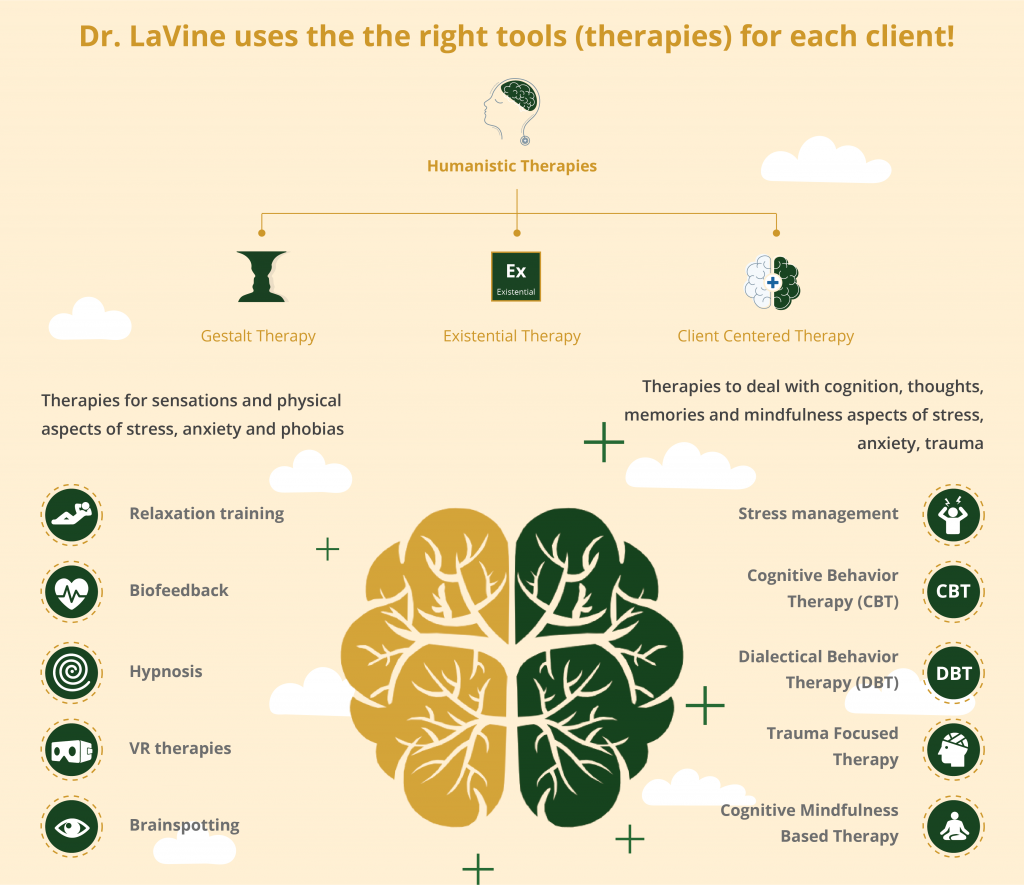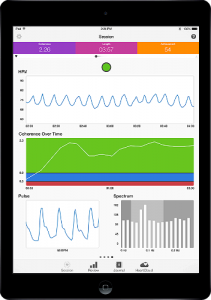Why are almost all of these disorders mind body disorders? With managing the autonomic system dysregulation (stress response) the key to them all?
Disorder
- Trauma-focused – Acute stress disorder and PTSD
- Mind-focused – generalized, anxiety, social anxiety, agoraphobia and other phobias and Obsessive-Compulsive Disorder (OCD)
- Body-focused – Migraines, panic disorder, IBS, Ticks
Stress Treatment
They all activate the stress response (fight, freeze or flight) and over time create an imbalance in the autonomic nervous system triggering emotional exhaustion, physical health issues and lead to negative view of life. A core skill to learn in recovering from these disorders is managing the stress response. Unresolved stress leads to health issues and anxiety. In turn, unresolved anxiety can lead to depression. Often, overtime individuals move back and forth vacillating from being in a stress state to an anxious state to a depressed state, without dealing with their core stressor or response sometimes functioning ok, while at other times not so well.
Treatment
I focus on treating neurological issues, as such, I understand and treat the “fight or flight” response, which creates the discomfort and pain associated with stress, and anxiety. Therapies used, to fit your exact situation and personality.

Dr. LaVine provides a safe place and a brilliant process to bring you to the point where you are comfortable with your thoughts, emotions and reactions to life events. Sleeping better, relating better and enjoying more of your day.
It starts out with some experiential work to relax and retrain your fight or flight instincts. This reduces tension, headaches, rumination, and the intensity of your emotions. You will be able to relax on command.” Often, if appropriate for you, hypnosis and/or biofeedback.

Therapies for anxieties, to fit your exact situation and personality, can include: Client Centered Therapy, CBT, Biofeedback, Hypnosis, Trauma Focused, Brainspotting (similar to EDMR) DBT, Solution Focused, Cognitive Mindfulness Based Therapy, and VR therapies.
We will figure out together the stressors, triggers, and patterns that bring on the anxiety and learn new ways of coping.
You will arrive at a place, where at your core you will feel and believe “I am going to be ok, no matter what”.
Why is it called stress?
Stress is a term that was borrowed from engineering, in psychological terms, stress is defined as having more demands than we think we can handle. This definition has in itself some power – it gives us control. We can change the amount of felt stress by changing how we appraise (see) the demands or how we perceive (evaluate) our resources. For example, if we appraise studying for a test as a challenge to learn, rather than as a hindrance to taking care of our children, the challenging demand will give us energy rather than sap energy.
Why you may or may not feel the stress response and its effects
Often the effects of stress are hidden below the level of consciousness, sometime not. When we are triggered by either an outside stressor, like a demanding boss, or an inside stressor, like a traumatic memory, our brains trigger a Neolithic response. This response is often referred to as fight, flight or freeze response. Our sympathetic nervous system is triggered and physiologically, a chemical cascade of cortisol and adrenaline starts. Our breathing, heart rate, perspiration, digestion and immune system are effected. Our thinking narrows and we become hyper-focused on the threat.
What are the ways of coping?
Experts divide coping into two broad categories 1. problem solving and 2. emotional coping
We are taught in our society to solve problems. So often, when we have an increased demand, say at home or work, we work harder at resolving the issue or getting things done. However, we often do that at the peril of second type of coping, emotional coping. We stop doing things that recharge us emotionally, things like eat leisurely and properly, recreate , take time with friends, or even sleep.
All is not lost; we can use these problem solving skills and our thinking brain to our advantage. I mentioned earlier, that we all appraise our threats, this is actually done a two levels. An initial appraisal, which is automatic. Think of the startle response, our subconscious is always on the look out and fires an immediate response when we sense something. For example, like the visceral response you have – to a certain pitch in a particular person’s voice, when you really haven’t heard what they said yet. But you still tense up. Then there is the second appraisal. This happens after you think about it. Self -Hypnosis and Mindful meditation skills learned in out Mind Body Mastery Skills Group help with the initial response by training the unconscious mind, while Cognitive therapy helps with the reappraisal process and breaking old thinking habits or traps.
Every demand takes emotional energy; this must be replenished. Emotional coping includes: taking breathing spaces, meditation, spending time with our friends, exercise, yoga, eating well, resting properly, and other spiritual practices.
How to overcome the behavioral consequences (i.e. bad habits – eating, smoking, gambling, shopping….) related to stress?
Stress leads to tension stored in the body, this creates unpleasant sensations, again often below level of awareness. Even so, we develop habits to deal with that tension – tapping, fidgeting, nail biting, smoking, excessive eating, gambling, and even excessive exercise. Our Mind Body Mastery Skills Group teaches how to release this tension and help break those habits. If you need additional help, Dr. LaVine is an advanced clinical hypnotist who has helped thousands break habits and reduce or eliminate symptoms with Hypnosis.
How do I overcome some of the physiological consequences of stress?
Chronic triggering of the stress response disrupts the autonomic nervous system and the immune system. Vascular and digestive systems can be greatly effected. This can result in headaches and stomach problems among other things. One of the more debilitating stress related disorders is Irritable Bowel Syndrome (IBS). Many unnecessarily live with this disorder undiagnosed, its core symptoms are abdominal pain and often irregularity, either constipation or diarrhea. Our 8 week IBS Protocol either group or individual uses the most effect mode of therapy for IBS relief, hypnosis. Research has been shown to relieve the symptoms of IBS with an 80 percent success rate. We have found great success with those who have other stomach and liver issues using the same protocol as well.
What happens emotionally with the stress response?
Anyone who has been so angry that they said things they did not want to say, or been so fearful of speaking in front of a group that their heart was pounding and their stomach hurt understand that the stress response fuels emotional intensity. Simply, the more or longer we are triggered in the stress response the more intense our feelings and more narrow our focus. If this stress becomes chronic, we lose perspective.
Why do I feel so emotionally depleted and stuck?
One consequence are negative sensations in the body created from all those stress hormones. Those uneasy sensations create a feedback loop taking us from no discernible emotion, to an irritated state, then to angry, rage, etc. Or alternatively if are worried instead of agitated, we go to preoccupied to an anxious state, to a state of panic. Once we cross a certain point of emotional intensity, we default to automatic behaviors such as eating, obsessing, acting out in various forms. We push away… instead of attracting others. (See Emotional Intensity SUDS scale and managing emotional intensity sidebar)
How is Anxiety related to stress?
One way of thinking about the difference between fear and anxiety is that in the case of fear, there is a definite immediate and discernible target for our fear, IE a burglar or maybe dangerous looking dog. Anxiety is more diffuse like worried about our future or maybe we are just generally worried at work. Uncertainty is a hard wired stressor. When we worry we, trigger the stress response. The stress hormones trigger unpleasant sensations that trigger tension, maybe below our level of consciousness that we want to make go away. We start thinking about what it is that could possibly cause us to feel so “bad”. We either can’t figure it out or do something about it. In either case the “thinking” sends another order to our autonomic nervous system to send out some more adrenaline and cortisol. The emotional stress responses of both anger (fight) or flight (fear) cause us to want to avoid situations and things that trigger those feelings. We get into a vicious cycle of thinking – stressing (feeling) – avoiding that builds on it self. Eventually, we are worried all the time Generalized Anxiety Disorder (GAD), or we become fearful of social situations Social Anxiety Disorder or we find behaviors that reduce the tension, such ad Obsessive Compulsive Disorder (OCD) or engage in the avoidance tactics.
How do I relieve my anxiety and feel better?
In short, break the cycle. Easier said than done. The key is to retrain the brain. IE give you the power to relax instantly, on command. Anxiety is a learned behavior. It grows as avoidance reinforces the anxious thoughts and the stress response makes the feelings more intense. Dr. LaVine, can use progressive muscle (PMG) relaxation techniques enhanced with hypnosis to work with you to release the tension in your body, that is fueling the anxious thought and feelings. Most people think you calm the mind, and then the body will follow, but it is just the opposite. It is easier to calm the body, as the body responds automatically to calm the mind. Many patients report instant results, breaking the cycle and feeling different immediately. Out of thousands of patients, none report it taking more that three sessions to get great benefit and to gain the skill to relax on command. RELAXATION BRINGS PLEASURABLE SENSATIONS to the body, to the mind and it brings great relief. If you don’t want to be hypnotized or feel you can’t be, these relaxation techniques can be used without hypnosis, just takes a bit longer. Once the stress part of the cycle is broken it is time to work on the THINKING and avoiding parts of the cycle using Cognitive Therapies, Existential Therapies if a major life change is involved, or Interpersonal Therapies if there is a long standing pattern of relationship issues.
What if I am also depressed, or depression is deeper than anxiety?
Depression is nature’s way of avoiding situations that cause you harm, evolutionary psychologist believe it evolved in Neolithic times to help shut down behavior that was causing the tribe to reject the individual. The most significant facts about depression is that once one depressive episode occurs the chance doubles for the next episode. After two episodes, recurrence is so statistically high that prophylactic medication is prescribed. What causes depression to reoccur are depressive pathways set into the mind as a byproduct of depressive thinking and rumination. There is a way out. It is using Mindfulness Based Cognitive Therapy to retrain the depressive pathways and reduce the symptoms. As a byproduct the increase awareness allows for alternative pathways to be developed to avoid relapse.

